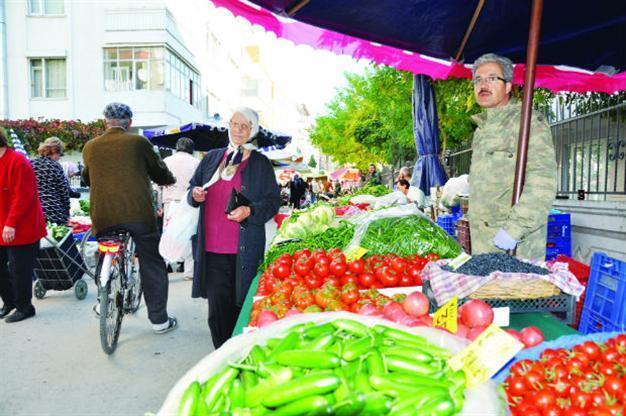Turkish agriculturalists seek measures as fresh produce prices plunge amid Russia crisis
ANKARA/MOSCOW

CİHAN photo
Turkish agricultural producers have asked for measures to stabilize fresh fruit and vegetable prices, which have plunged almost by half after Russia announced that it would halt the imports of many agricultural products by the beginning of 2016 amid a diplomatic crisis with Turkey. Sector representatives have defined the situation as “unexpected panic,” which has triggered speculative price slumps.
After the diplomatic crisis erupted between Turkey and Russia on Nov. 24, Russian authorities stopped the inflow of Turkish goods into the country, according to Turkish officials.
“A total of 160 tons of fresh fruits and vegetables have been turned back from Russia since Nov. 24. This amount is very small, but Russia’s announcements to stop the imports have created a panic mood, pushing down the prices by 40 percent across Turkey,” said the head of the Turkish Union of Agricultural Chambers (TZOB), Şemsi Bayraktar, in a press conference on Dec. 4, as quoted by Anadolu Agency.
Bayraktar noted some circles have tried to benefit from this situation.
“Some circles want to buy the products for cheaper prices by claiming many producers will earn nothing as they will not make exports. This is the real danger,” he added.
He underlined there were huge uncertainties in the sector, encouraging many producers to sell their yields as soon as possible.
“This has pushed down the prices dramatically,” he noted.
Bayraktar said the price of one kilogram of tomatoes at the wholesalers had decreased from 1.5-2 Turkish Liras to 1.3 liras, and one kilogram of oranges from 50-60 kuruş to 30 kuruş.
No to tomatoes, yes to lemons
The Russian order, published on the government’s official website on Dec. 1, included a list of the agricultural products that Russia will no longer import from Turkey from Jan. 1, 2016.
The list included fruits and vegetables such as tomatoes, onions, grapes and apples, as well as chicken products. It did not include lemons or nuts, of which Russia imports large quantities from Turkey. Many companies that are active in the Antalya Fresh Fruit and Vegetable Wholesale Market have already opted to halt their operations amid Ankara’s diplomatic crisis with Moscow, Doğan News Agency reported.
Bayraktar noted Turkey exports around $622 million worth fresh fruits and $385 million worth of fresh vegetables annually. The country sold around $763.8 million worth of agricultural products to Russia in the first 10 months of 2015.
Meanwhile, Turkey’s annual inflation rate increased above estimates to 8.1 percent in November from 7.58 percent in October due to a sharp hike in footwear and clothing prices, according to data revealed by the Turkish Statistics Agency (TÜİK) on Dec. 3. Many analysts have expected the continuance of the rise in the short-term, adding that a decreasing trend will likely occur gradually due to several factors, such as an expected decrease in food prices amid the Russian sanctions on Turkish agricultural goods.
Bayraktar underlined the current price plunge will likely result in a huge price hike by next year, as there will be a decline in supply.
He called for immediate measures to protect producers from the government.
